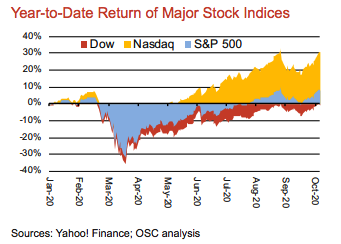State comptroller’s reports: Wall Street soars while Main Street droops
Two reports from the state comptroller’s office show that, while Wall Street is doing well in the midst of the pandemic — securities-industry profits grew by 82 percent in the first half of 2020 — Main Street is not.
Halfway through the state’s fiscal year, state tax receipts are trailing last year by $2.8 billion, according to the September State Cash Report released this week by Thomas DiNapoli, the state’s comptroller.
September sales tax revenues were down from 2019 by $88 million. That drop of 5.4 percent was the lowest monthly decline for sales tax since the fiscal year began in April. However, year-to-date sales tax collections are still 17.2 percent lower than the same period last year, DiNapoli said.
“COVID-19 had a significant negative effect on the first half of the state’s fiscal year,” DiNapoli said in a statement, releasing the report. “The pandemic has created a profound degree of uncertainty, but one thing is clear – Washington must get its act together and help states and local governments weather this economic storm.”
In his October report on the securities industry in New York City, DiNapoli reported that the COVID-19 pandemic has affected both operations and profitability of the securities industry.
“After a period of market turmoil in March, monetary stimulus and fiscal relief actions have injected massive liquidity into the economy and buoyed industry profitability ...,” the report says. “The industry has remained relatively stronger than other sectors, which have experienced a more severe downturn (i.e., hotels, bars, restaurants and retail).”
In an earlier report, DiNapoli found that New Yorkers making low wages continue to suffer a disproportionate share of job losses statewide and especially in New York City.
Among the nearly 1.3 million net jobs the state lost from March through August, more than 320,000 were in hotels and food services. These losses represented 41 percent of jobs in the industry before the recession hit, and one in every four jobs lost in all sectors statewide.
Workers in food and accommodation services are disproportionately likely to be Black or Hispanic, according to Bureau of Labor Statistics data. The average annual wage in 2019 for hotel and restaurant workers was $30,689, less than half the overall average for the state of $75,367.
Retail trade, another sector with comparatively low wages, lost 93,000 jobs, one in every 10 of its previous total.
By contrast, finance and insurance employment, among the highest paid jobs in New York State, declined by 19,000 or 3.7 percent.
“Securities industry profits grew by 82 percent in the first half of 2020 (to $27.6 billion), the best first half since 2009,” the October report says. “In the first two quarters of 2020, the industry has nearly eclipsed the total amount of annual profits reported for 2019.”
The report also says that, while industry profitability has grown, employment in New York City’s securities industry has declined slightly. The sector is on pace to lose 7,300 jobs in 2020, erasing close to half the job gains (45 percent) since 2013.
But the report also says that the current employment decline looks milder than in the previous two economic downturns (2001 and 2009), where the industry faced three consecutive years of job losses before growth resumed.
“The current downturn poses new questions, however, regarding the duration of the public health crisis and associated changes to behavior, including an accelerated adoption of technology,” the report says, concluding, “Its full impact remains uncertain.”



